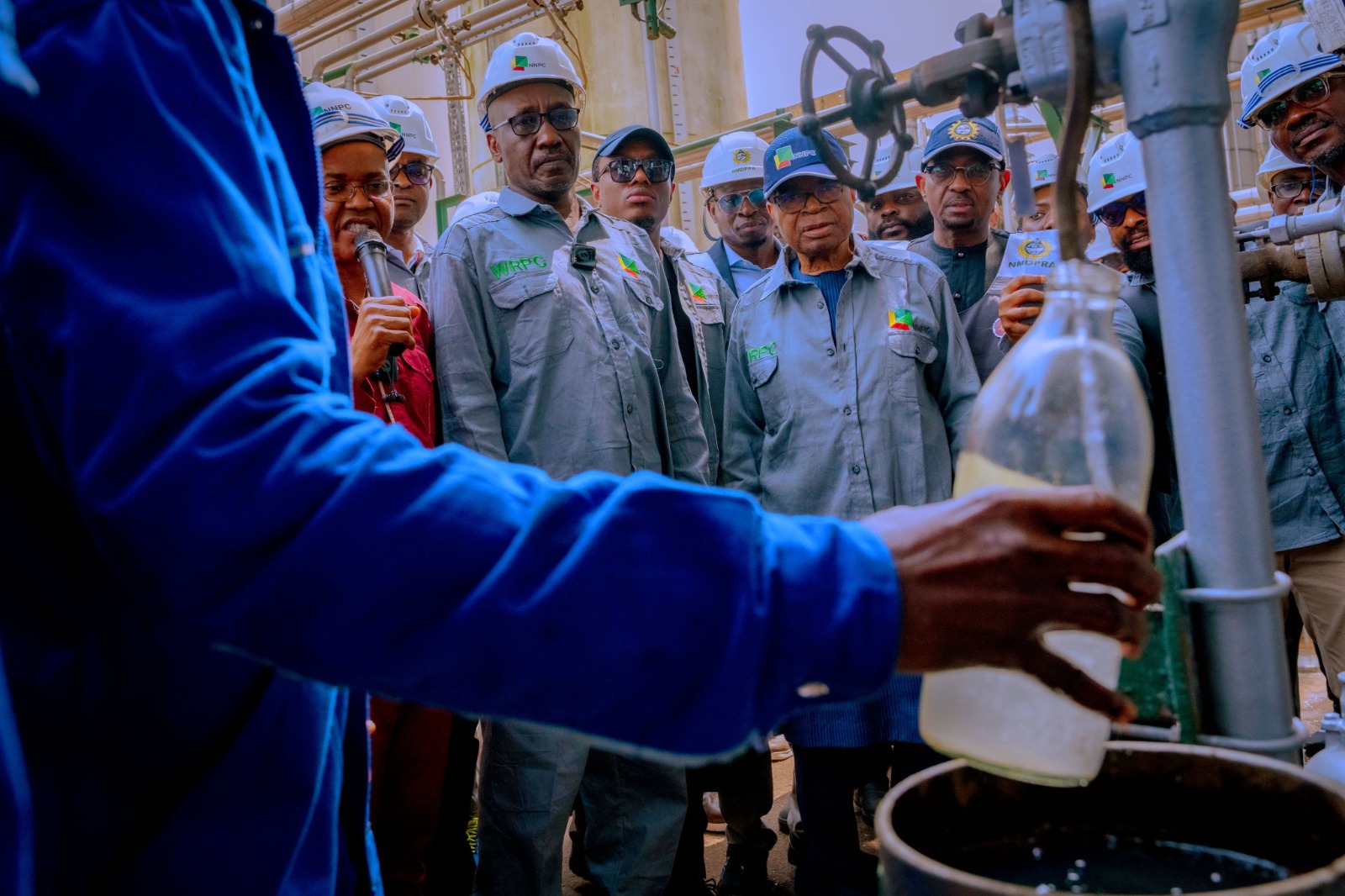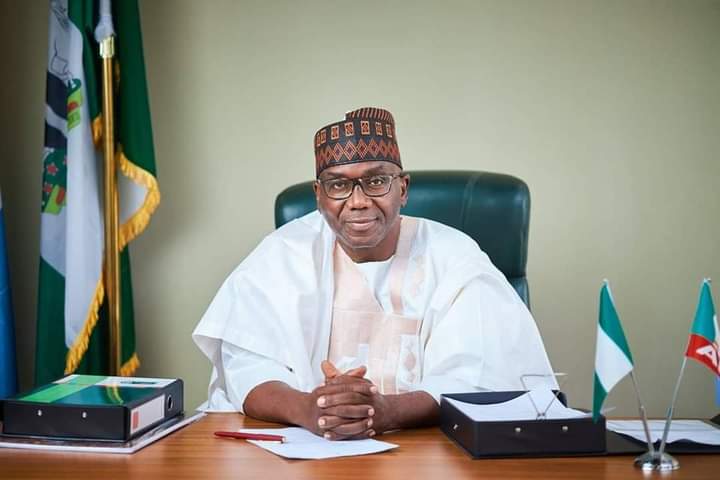 • Stakeholders worried over Dangote, NNPC fight for market share
• Stakeholders worried over Dangote, NNPC fight for market share
• Nigeria imports nearly 80% of PMS despite revival of local refineries
• Warri Refinery resumes operation, Kaduna on verge of starting, says NNPC
• Nigeria’s petrol consumption hits 40m litres/day
Nigeria may continue to import about 30 million litres of premium motor spirit (PMS) daily despite the steady revival of local refining with Warri Refining and Petrochemicals Company (WRPC) coming back to life yesterday to ramp up local capacity.
The Nigerian National Petroleum Company Limited (NNPCL), yesterday, disclosed that the 125,000 barrels per day facility is now operating at 60 per cent capacity even as President Bola Tinubu described the development as part of his determination to ramp up local refining capacity and make Nigeria a hub for Africa’s downstream sector.
Going by projections, the Group Chief Executive Officer of NNPCL, Mele Kyari, in November, told the Speaker of the House of Representatives, Tajudeen Abbas, that the country would end the importation of refined petroleum products in December, which ends today.
“I can confirm to you that by the end of December this year, we will start the Port Harcourt refinery; early in the first quarter of 2024, we will start the Warri refinery and by the end of 2024, the Kaduna refinery will come into operation.
“This is the commitment we are giving today and you can hold us accountable for this. In 2024, many of the initiatives including the rehabilitation of our refineries and also the efforts of small-scale refineries, and the upcoming Dangote refinery, will make Nigeria a net exporter of petroleum products,” Kyari had said.
This comes at a time when about 1 million barrels per day (bpd) of refining capacity in Europe and the United States, including Scotland’s Grangemouth refinery, LyondellBasell’s Houston facility, and Phillips 66’s Los Angeles Refinery, will be locked permanently beginning from tomorrow. Nigeria has been importing about 31 million litres of PMS daily, which the new Warri Refinery will reduce slightly.
Meanwhile, the recent pricing review in the downstream segment of the country’s petroleum industry has raised fresh concerns among industry players who insisted that the market structure in the industry remained anticompetitive with large dominant firms fighting for market shares and dominance at the expense of the industry growth.
While announcing the return of Warri Refinery yesterday, Kyari noted while NNPCL has not achieved 100 per cent completion, Warri Refinery “is up and running,” despite doubt by some people that the achievement is impossible.
Hinting also that the Kaduna Refinery is on the verge of completion, Kyari said the success is the result of collaboration with contractors and everyone in the company, including the entire staff.
According to him, the achievement is historic and demonstrates the possibility of restarting a plant that was shut down.
Kyari noted that the plant operates in three stages and the company has commenced operations for stage one, which produces Naphtha and blended products of high quality that are essential for the country.
He said the products, beyond meeting local needs, position the country for potential export to international markets.
Tinubu, in a statement by his Special Adviser on Information and Strategy, Bayo Onanuga, said his administration’s comprehensive plan to ensure energy efficiency and security is entirely on course.
“The restart of Warri Refinery today brings joy and gladness to me and Nigerians. This will further strengthen the hope and confidence of Nigerians for a greater and better future than we promised. This development is a remarkable way to end the year following the feat recorded earlier with the old Port Harcourt Refinery. I am equally happy that NNPCL is implementing my directive to restore all four refineries to good working condition,” Tinubu said.
Dangote Refinery has, in recent weeks lowered the price of PMS from N990 to N970 per litre and afterwards moved further to N899.5 per litre while the NNPCL followed with a price reduction based on regional pricing scheme, where its product sells in Lagos for N899, Warri, N970; Oghara N970, Port-Harcourt N970 and Calabar N970 per litre.
These come as Nigeria’s current daily petrol consumption has hit approximately 40 million litres with local production, according to truck out data from the Nigerian Midstream and Downstream Regulatory Authority (NMDPRA), accounting for only 8.2 million litres. Dangote Refinery contributes an average of seven million litres while NNPCL controls 1.2 million litres.
This means that only 20.5 per cent of the country’s petrol need is met through local refining, while the remaining 79.5 per cent or 31.8 million litres o are imported.
The Dangote Refinery plays a significant role in local production, accounting for 87 per cent of the current total locally-refined petrol, while NNPC contributes 13 per cent from its Port-Harcourt Refinery.
The development shows that the country still relies heavily on importation, despite the initial projected 100 per cent local sufficiency before year-end.
This means that Nigeria is still vulnerable to the vagaries of the external market, which will be hit by the shutting down of refineries across the world, including Europe where the country sources its products.
While the Crude Oil Refinery Owners Association of Nigeria (CORAN) said Nigeria has a combined installed refining capacity of about 1,222 barrels per day (coming from NNPCL’s 445,000bpd in Port Harcourt, Warri and Kaduna; 650,000bpd Dangote Refinery, Aradel’s 11,000bpd, 10,000bpd by OPAC, Waltersmith’s 5,000 bpd) all the facilities have struggled to perform in 2024 with NNPC yet to bring on stream the full capacity of the Port-Harcourt and Dangote producing far lesser than expected amidst crude oil challenges.
Two sources within the value chain told The Guardian that prior to the recent price slash by Dangote and NNPC, some operators had met over stabilising pricing but could not reach a consensus. The disagreement had reportedly led to the current price war.
“There was a meeting and depot owners were asked to stabilise prices but they insisted that price fixing would be illegal. They woke up to see that prices went down even when they had old stock. A lot of them lost money,” a source, who pleaded anonymity, told The Guardian.
As of January 2024, the average price of petrol was N668.3 Nigerian naira per litre, which is around $0.41 with a level of subsidy as at then, yesterday, the average price stabilised around N1,005 per litre across the country with subsidy total removed.
Renowned energy expert, Prof. Wunmi Iledare, while shedding light on the downstream sector, described the market as an oligopoly, which portends danger for the consumers.
While the sector is now on the path of deregulation, he cautioned that the battle for market dominance among key participants, NNPC Limited, Dangote Refinery and a consortium of importers is shaping current pricing trends.
“What you see is not a price war,” Iledare said, adding: “It is the outcome of the battle for dominance among key market participants.”
He explained that the interdependent pricing mechanism in the sector is a hallmark of oligopolistic markets, where a few large firms wield significant influence.
Drawing a comparison with Nigeria’s telecom industry, he highlighted how similar market structures led to competition among dominant players while maintaining high entry barriers for smaller participants.
Iledare reiterated that deregulation does not mean the absence of regulation, emphasising the role of the Petroleum Industry Act (PIA), especially through the NMDPRA in ensuring governance.
“PIA professionals understand how petroleum sector governance works. The Petroleum Authority, as the regulatory institution established under the PIA, serves as a watchdog to detect and address anticompetitive behaviour,” he said.
Stressing the importance of regulation in maintaining energy security across four critical dimensions – affordability, availability, accessibility and sustainability – Iledare said: “Hopefully, they have the competency to bark and bite.”
Iledare insisted on the need for proactive regulatory oversight to prevent actions that could undermine long-term energy security.
President of the Nigerian Economic Society (NES) and energy scholar at the University of Ibadan, Prof. Adeola Adenikinju, said the presence of more suppliers is crucial for healthy competition and to prevent any single entity from exercising dominance.
According to him, regulators have a critical role in ensuring that no player attempts to monopolise the market or engage in anti-competitive practices.
“If the system works well, consumers stand to benefit from improved production and operational efficiencies, as competition among market operators could lead to lower profit margins and, ultimately, reduced prices,” Adenikinju said.
Adenikinju expected petrol prices to drop given reduced crude oil prices in the global market, coupled with the appreciation of the naira but said the development became less about market forces and more about strategic positioning.
Adenikinju said: “What happened was more of a strategic manoeuvre to dominate the market and establish price leadership.”
Adenikinju stated that the ability of the NNPC to match the Dangote Refinery in price-setting is seen as a positive development for the market, adding however that, sustaining such parity will require NNPC to maintain high levels of production and operational efficiency in the long term.
“About 70 per cent of the cost of petrol comes from crude oil prices and the exchange rate, while 10 per cent stems from refining costs and the remaining 15–20 per cent from margins and charges by distributors, transporters, marketers, and regulators. This means that refiners and domestic players must focus on refining efficiency and competitive margins,” he said.
An energy expert, Prof. Dayo Ayoade, noted that the economics of the recent price reduction does not make sense, stressing that while the news was cheering, the operators wouldn’t be able to sustain it.
Ayoade also raised concerns about NNPC’s profitability as a private company, particularly given the challenges facing the Port Harcourt Refinery despite a $1.5 billion investment.
“I don’t believe that you can have genuine, proper competition when you essentially have only two players in the market and this competition is not even being driven by the Nigerian Mainstream Downstream Petroleum Regulatory Authority (NMDPRA). So, what’s the basis for the price going down? For me, it’s a bit premature. I don’t understand it because as far as the market is concerned, I can see Dangote is the major player, NNPC is not a player,” he said.
Describing current moves as artificial and political competition, he said when one part gives up, it would crash.
Ayoade said competition is in the interest of the consumer as it drives down prices, adding that real competition happens when other refineries come into play like the proposed BUA and other modular refineries.
Energy Partner at Bloomfield, Dr. Ayodele Oni told The Guardian that the improved Naira rate and drop in crude prices pushed product prices downward, adding that the price war and competition between NNPC and Dangote would have a significant effect on the industry, including the consumers.
He, however, mentioned that the development would enhance and encourage competition in the sector, serving as a catalyst to disrupting market dominance and creating a more competitive environment which may ultimately have a positive effect on the industry.
Asking stakeholders to improve market efficiency, he called for adherence to regulatory standards and innovation in the industry.
“Consumers are the immediate beneficiaries of the competition, as it leads to reduced petrol prices. This lowers the cost of transportation, goods, and services, positively impacting household budgets and generally access to petroleum products,” he said.
Oni said the price war may take six months or more, largely depending on the parties, market reaction and other factors like the Naira to dollar rate, price of crude, finance, access to resources, market demands, consumer reaction, government intervention, and operational capacity amongst others.
He said the move aligns with what the masses deserve, especially affordable fuel and improved services in a sector that has long been dominated by inefficiencies and monopolistic practices.
“Both NNPCL and Dangote aim to balance competitive pricing with profitability. Their price cuts are strategic, and aimed at attracting customers, not acts of benevolence. We should ensure or rather the government and other industry stakeholders should ensure that the competitive pricing remains sustainable and does not devolve into monopolistic practices once one player gains an upper hand,” he said.
Yesterday, PMS sold in Abuja at an average of N1,008, in Maiduguri it sold at about N1,180 per litre while in Lagos some NNPC stations were dispensing at N925 per litre. Others in the southwest states sold between N965 to N1,000 per litre.
An energy expert, Olusesan Okunade said the sector is undergoing healthy competition, stressing that development is expected as seen in the telecoms sector.
Okunade mentioned that at least the price has crashed from over N1000 to about N900 per litre from some of the major markets.
He however urged the downstream regulatory body to monitor the activities of the fuel stations.






